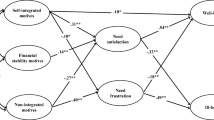Abstract
An empirical study published in the Journal of Personality and Social Psychology (King, L. A. and C. K. Nappa: 1998, Journal of Personality and Social Psychology 75(1), 156–165) concludes that people generally believe meaning and happiness are essential elements of the good life, whereas money is relatively unimportant. Yet, the authors also state that although “we do know what it takes to make a good life...we still behave as if we did not.” The authors are suggesting that despite a general belief that money is relatively unimportant in creating happiness, many people continue to focus their behaviors on increasing income and wealth. This is the classic conflict between the folk wisdom that money cannot buy happiness, on the one hand, and a continued focus by many people on achieving material success on the other. The issue is of particular importance to business professionals, not only because profit maximization is the central focus of business, but also because college students often pursue business as a profession for the express purpose of maximizing personal income and wealth. In the business world a focus on personal financial success is the norm. Wealth and income are honored. The purpose of this article is to critically analyze psychological studies comparing happiness and financial success. The results are then contrasted with philosophical wisdom and religious writings comparing happiness and money. The intent is to determine whether psychological studies provide incremental insights into the connection between financial success and happiness.
Similar content being viewed by others
References
Aristotle (revised edition): 2004, ‹Aristotle: The Nicomachean Ethics’ (J.A.K Thomson translator), Penguin Books, London.
Burke R. J., MacDermid G. (1999) Are Workaholics Job Satisfied and Successful in Their Careers?. Career Development International 4(5):277–282
Dalai Lama: 2005, The Essential Dalai Lama (R Mehrotra editor). Hodder & Stoughton, London.
Diener E., Suh E. M., Lucas R. E., Smith H. L. (1999) Subjective Well-Being: Three Decades of Progress. Psychological Bulletin 125(2):276–302
Dostoyevsky, F.: 1958, ‹The Brothers Karamazov’ (C. Garnett Trans.), (Penguin Putnam, New York).
Fromm, E.: 1976, ‹To Have or to be’?(Harper & Row, New York).
Funk R. (eds) (1995) The Essential Fromm: Life Between Having and Being. Continuum Publishing Company, New York
Gibran K. (1923) The Prophet. Knopf, New York
History of Philosophy: 2006, Encyclopaedia Britannica. Retrieved January 19, 2006, from Encyclopaedia Britannica Premium Service http://www.britannica. com/eb/article-8579
Hughes G. J. (2001) Routledge Philosophy GuideBook to Aristotle on Ethics. Routledge, New York
Kasser T., Ryan R. M. (1993) A Dark Side of the American Dream: Correlates of Financial Success as a Central Life Aspiration. Journal of Personality and Social Psychology 65(2):410–422
Keyes C. L. M., Ryff C. D., Shmotkin D. (2002) Optimizing Well-Being: The Empirical Encounter of Two Traditions. Journal of Personality and Social Psychology 82(6):1007–1022
Killinger B. (1991) Workaholics. Firefly Books, Buffalo, New York
King L. A., Napa C. K. (1998) What Makes a Life Good?. Journal of Personality and Social Psychology 75(1):156–165
Lao-tzu: 1961, ‹Tao teh Ching’ (John C.H. Wu Trans.), (Shambhala Publications, Inc., Boston).
Maslow A. H. (1954) Motivation and Personality. Harper & Row, New York
Nietzsche F.: 1954, “The Portable Nietzsche” (W. Kaufmann editor and translator) (Viking Penguin Inc., New York).
Robinson B. E. (1998) Chained to the Desk: A Guidebook for Workaholics, Their Partners and Children, and the Clinicians Who Treat Them. New York University Press, New York
Rogers, C.: 1961, On Becoming a Person (Houghton Miffin, Boston)
Rogers, C.: 1963, ‹The Actualizing Tendency in Relation to ‹Motives’ and to Consciousness’ Nebraska Symposium on Motivation, in M. R. Jones (ed.) University of Nebraska Press, Lincoln, 11, 1–24.
Ryan R. M., Deci E. L. (2001) On Happiness and Human Potential: A Review of Research on Hedonic and Eudaimonic Well-Being. Annual Review of Psychology 52:141–166
Ryff C. D. (1989) Happiness is Everything, or Is It? Explorations on the Meaning of Psychological Well-Being. Journal of Personality and Social Psychology 57(6):1069–1081
Solberg E. G, Diener E., Robinson M. D. (2004) Why are Materialists Less Satisfied?. In: Kasser T., Kanner A. D. (eds), Psychology and Consumer Culture: The Struggle for a Good Life in a Materialistic World. American Psychological Association, Washington DC, pp 29–48
Solomon, S., J. Greenberg, and T. A. Pyszczynski: 2004, `Lethal Consumption: Death-Denying Materialism', in T. Kasser and A. D. Kanner (eds.), Psychology and Consumer Culture: The Struggle for a Good Life in a Materialistics world (American Psycological Association, Washington DC), pp 127–146
Srivastava A., Locke E. A., Bartol K. M. (2001) Money and Subjective Well-Being: It’s Not the Money, It’s the Motives. Journal of Personality and Social Psychology 80(6):959–971
Waterman A. S. (1993) Two Conceptions of Happiness: Contrasts of Personal Expressiveness (Eudaimonia) and Hedonic Enjoyment. Journal of Personality and Social Psychology 64(4):678–691
Zimmer H. (1951) Philosophies of India. Princeton University Press, Princeton, NJ
Author information
Authors and Affiliations
Corresponding author
Additional information
Kent Swift PhD, is a professor in the College of Business Sciences at Zayed University. He has been teaching business at both the undergraduate and graduate level in science 1978, and he has published articles on a variety of business topics. Dr. Swift received his PhD from the University of Wisconsin – Madison.
Rights and permissions
About this article
Cite this article
Swift, K. Financial Success and the Good Life: What have We Learned from Empirical Studies in Psychology?. J Bus Ethics 75, 191–199 (2007). https://doi.org/10.1007/s10551-006-9246-7
Received:
Accepted:
Published:
Issue Date:
DOI: https://doi.org/10.1007/s10551-006-9246-7




